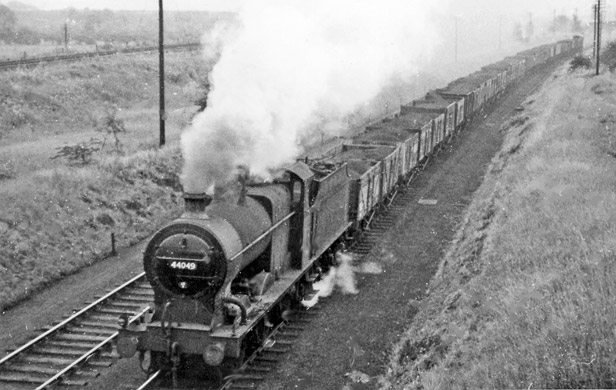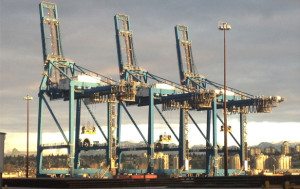
By Chris Rose – republished with permission from Desmog.ca
Canada’s largest port has given the green light to a proposed controversial facility on the Fraser River that would unload U.S. coal destined for energy-hungry Asia.
Despite facing significant environmental and health concerns, Port Metro Vancouver said in its decision, released last Thursday, that the proposed coal transfer facility at Fraser Surrey Docks poses no unacceptable risks.
The $15 million project could handle at least four million metric tonnes of coal per year delivered by the Burlington Northern Sante Fe Railway Company. It will then be loaded onto barges at the Surrey facility and transferred to ocean-going carriers at Texada Island, prior to export.

Referring to environmental studies and mitigation efforts, Jim Crandles, Port Metro Vancouver’s director of planning and development, was quoted as saying “we are confident that the project does not pose a risk to the environment or human health and that the public is protected.”
Disappointed opponents, however, said there are many unanswered questions about local and regional impacts of building and operating the facility.
Those include coal dust and diesel exhaust exposure in local populations, fire risks associated with storing coal in open barges in local communities, noise impacts, emergency vehicle access constraints, and impacts associated with transporting coal in open barges on the ocean.
“If it goes ahead, this decision means more U.S. coal trains travelling through our communities,” Kevin Washbrook, director of Voters Taking Action on Climate Change, told DeSmogBlog in an email Friday.
[quote]It means more coal being shipped to Asia to be burned, and more emissions into our atmosphere, at a time when we absolutely, positively need to cut back on those emissions. All to run uncovered, football field-length barges of U.S. thermal coal down the world’s richest salmon river.[/quote]
Washbrook, who has compared Big Coal to Big Tobacco and its efforts to obscure the risks of smoking in order to keep making huge profits, added the decision will be challenged through the local air quality permitting process, during the coming municipal elections in November and in court.
Simon Fraser University health sciences professor Tim Takaro said the project runs contrary to public health.
“Coal is a fuel of the last century,” Takaro says.
[quote]We have to stop using it sometime and here’s a great opportunity to apply society’s ‘brakes,’ join communities in the U.S. that have refused to ship this same product, and think of the future generations who will inherit the messes we make.[/quote]
The Port Metro Vancouver decision comes shortly after the Oregon Department of State Lands rejected a proposal to export 8.8 million tons per year of coal to Asia from the Port of Morrow in Boardman.
But as DeSmogBlog noted on Thursday, the Long Beach City Council had just approved a proposal to export coal and petroleum coke, which is a tar sands by-product, to the global market, mainly Asia, to the tune of 1.7 million tons per year.
Last November, the Winnipeg Free Press reported a group of concerned citizens, environmentalists and scientists asked Port Metro Vancouver officials to delay any expansion of coal-exporting facilities, saying public input was required and climate change problems would be increased as a result of the projects.
Among those who signed a letter opposing any coal port expansion were David Suzuki, Naomi Klein and James Hansen, director of NASA’s Goddard Institute for Space Studies, the first scientist to warn the U.S. government of the potential dangers of unmitigated climate change and who described coal-fired power plants as “factories of death.”
[signoff3]


Thanks for a good website. I’d like to add that the US is busy producing oil from shale source rocks. This oil was not producible by conventional means, but it is by horizontal drilling and hydraulic fracturing. As time goes by oil from the Athabasca tar sands faces three challenges. The first is that as oil production in the US ramps up, domestic oil prices will fall. The second is that the US is not the only country with these reserves and other countries will develop their own resources. The third is that refineries everywhere will be geared to process lighter, cleaner, oils. Unless Canada can get Athabasca oil to market soon (and flood Asia with cheaper bitumen products from Alberta in a hurry), nobody will want the stuff. The tar sands made economic sense in a world that was past ‘oil peak production’. However that benchmark has been moved into the distant future. In regards to coal being exported from Vancouver. Coal producers face a similar problem. – That of abundant natural gas and plentiful domestic oil. Energy production (however you view it) is not an immediate problem for industrialised countries, and ‘dirty oil’ and ‘dirty coal’ will become energy resources of last resort. Canada’s main market China, is already trying to reduce coal burning, and complex refineries to handle bituminous oils are not going to be built if lighter oils are available. It is interesting that the port in Tacoma, Washington is building an LNG plant. BC by promoting oil pipelines and coal export seems stuck in a political/corporate time warp. We may yet dodge the pipeline/coal shipment bullet.
I have read commonsense Canadian as well as other environmental sites,for a few years.The people of bc are well informed about a corporate owned liberal government that is facilitating the annihilation of all we value. What has been accomplished? The federal and bc provincial government continue to commit one environmental atrocity after another; business as usual.The government is not accountable .They commit crimes,then lie about it.We are governed by criminals who should be in prison. My point is all the information and truth we read in the various environmental sites has not changed anything.I continue to watch as all I hold dear being destroyed faster then I could possibly imagine.
While I share your frustration, Mark, I don’t think it’s entirely fair to say that nothing has changed. We face nothing less than the biggest onslaught of corporate-driven fossil fuel development in history. The planned transformation of the Western Canadian Sedimentary Basin into the next big global fossil fuel supplier and Western Canada into the primary conduit to access foreign markets.. Oil/tar sands, shale gas and LNG, coal. At least 10 major oil and gas pipelines. More than 20 proposed oil, gas and coal shipping terminals…
And here’s the thing: Not A SINGLE ONE OF THEM has yet to be built. Not one. The earliest exception may prove to be this Fraser-Surrey coal dock. But all of these projects face an uphill battle due to a combination of public and First Nations opposition, legal actions, and various economic challenges, such as we now see facing LNG and shale gas.
Let us not kid ourselves, though. This is a big battle. The odds are most certainly stacked against the public and environment. But to suggest that nothing is changing – well, I think that’s selling us all short.
You may also be putting too much on the shoulders of individual publications. Informing the public, as you rightly point out, doesn’t in itself guarantee positive change. It is one piece of a bigger system of solutions required – and clearly, unless information is transformed into action, then nothing will come of it.
So that requires full-scale public engagement and mobilization, which I do see happening in many encouraging ways.
Thank you for your readership and support. I encourage you not to lose hope and to stay engaged for the long haul. Take heart in our successes, but know there is much more that we can and must do.
https://www.change.org/p/the-concerned-citizens-of-british-columbia-ask-for-the-resignation-of-premier-christy-clark#